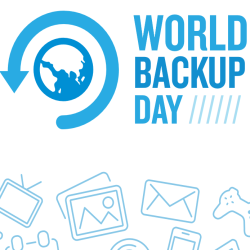Over the past few weeks, we have seen a massive shift in how people work. With millions of people across the world suddenly working from home, many employees are now faced with a new technological setup that they may not yet be comfortable with. As people trade their offices and desktop PCs for laptops and home Wi-Fi networks, it is vital that people are given clear guidance as to how to protect their computers and their data at home. It is for this reason that this year’s World Backup Day is even more important than ever.
Held every year on March 31, World Backup Day serves to highlight the dangers of failing to store backup copies of your important documents and files. There are many ways in which you can wind up losing data, from a simple mistake like a coffee spilled over a laptop to a technological failure such as a crashed application. A particularly worrying threat, however, is the prospect of falling victim to a targeted hack; this is a major hazard, as not only does it give the hacker access to the victim’s files, but it also gives the hacker the opportunity to blackmail the victim for data return.
For individuals, the loss of data often brings a sentimental cost, but for businesses, the economic consequences can be severe. Data loss can cripple organizations, causing both reputational harm and financial damage, but many businesses remain unaware of the best ways to protect their data.
During a time when employees are working from afar, and across a range of home networks, it is vital that businesses make data backup and protection a priority. The first step is to educate employees on the dangers of data loss, in addition to basic IT and cybersecurity training. Ensuring that employees know how to safely edit, move, or delete files on or between servers, or spot the signs of a spam email or dodgy link, can save you from a much larger hassle down the road.
Next, it is crucial that activated automated backups be standard practice. Remembering to physically back up data every time you use a file is time consuming and unreliable, but with an automated system in place, you can ensure that your data is constantly being backed up. This drastically reduces the likelihood of a disaster caused by human error. You should also make sure that you have a process established in the event of an employee making a mistake; staff should know to report the loss to an administrator as soon as possible.
In order to ensure that your software is always up to date, turn on automatic updates for all applications. Hardware and system errors are one of the main culprits of data loss, and keeping your systems updated is a great step to increase your data security. Lastly, adjust your control settings to restrict employees’ access so that they can only edit the files and folders that are relevant to them. If an employee can’t access a file, he or she can’t accidentally delete it.
Be it big or small, every organization benefits from good backup technology and processes. In light of World Backup Day, take a second to consider what would happen if you were to lose your key files. If this is a worrying thought, it is time to back your files up.
